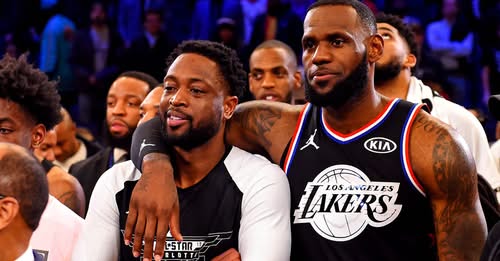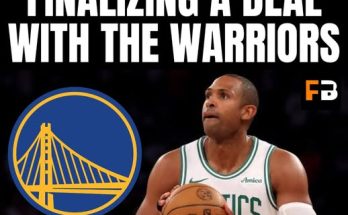Dwyane Wade’s NBA career is one defined by brilliance, sacrifice, and a lasting imprint on basketball history. But buried under his championship rings, highlight reels, and Hall of Fame enshrinement lies a tantalizing “what if”—a version of Wade who stayed healthy, untouched by the physical toll that robbed him of his prime years. In a recent revelation that stirred reflection among basketball enthusiasts, Wade admitted he once believed he could catch Michael Jordan. Not in branding or global appeal—he knew the terrain Jordan conquered was nearly mythical—but on the hardwood, with pure basketball dominance, Wade’s competitive fire burned with an MJ-like intensity. This wasn’t bluster. It was the honest belief of a player who, for a short window, was as dominant as anyone who ever touched the court.
Dwyane Wade’s ascent was fast and fierce. From his breakout at Marquette to being the fifth overall pick in the 2003 NBA Draft, Wade entered the league during a time of rich talent. LeBron James, Carmelo Anthony, and Chris Bosh were part of that same draft class, yet Wade carved out his own legacy, anchored by his unique brand of ferocity, finesse, and fearlessness. It was in his third year—2006—when the world saw the full fury of Wade unleashed. He led the Miami Heat to their first NBA championship, averaging 34.7 points per game in the Finals and earning Finals MVP honors. His performance, particularly in the clutch moments, drew comparisons to Michael Jordan himself. That Finals series alone planted the seed in Wade’s mind that maybe, just maybe, he could chase the ghost in Chicago.
Wade had every reason to believe. He wasn’t merely a scoring machine—he was a complete player. A two-way star with elite defensive instincts, uncanny mid-range touch, finishing ability that defied physics, and leadership that energized his team. He attacked the rim with a reckless abandon that, while awe-inspiring, would ultimately accelerate the wear and tear on his body. In his prime, Wade was unguardable. He averaged 30.2 points, 7.5 assists, 5.0 rebounds, and 2.2 steals in the 2008-09 season—MVP-level numbers that led the league in scoring. That version of Wade was electric, a human lightning bolt in a Miami jersey, willing himself into the paint, absorbing contact, and dancing in mid-air as defenders flailed helplessly.
It’s no wonder Wade thought he could reach Jordan. During those years, nothing seemed impossible. He wasn’t trying to emulate MJ’s style; he had his own flavor. But he aimed for that same level of greatness—titles, individual accolades, and eventually, a place atop the all-time shooting guard list. “I used to think I could catch Michael Jordan,” Wade admitted in a candid interview. “If I could stay healthy, if I could keep playing the way I was playing, I believed it.” That belief wasn’t ego. It was the inner fire every great player needs—the ambition to transcend the limits others place upon them.
But ambition alone can’t overcome biology. Injuries would become the great equalizer, slowing Wade just as he was entering his most productive years. Knee problems, in particular, dogged him throughout his career. Multiple surgeries, lingering pain, and an evolving role in Miami’s team dynamics altered his trajectory. By the time LeBron James and Chris Bosh joined him in Miami in 2010 to form the famed “Heatles” superteam, Wade was already adjusting. He was still great—but now he had to share the ball, take fewer shots, and conserve his energy. His sacrifice led to two more titles and four straight Finals appearances, but the Wade of 2009—the one who could drop 50 on any given night—was starting to disappear.
What makes Wade’s reflection so poignant is how rooted in reality it is. He doesn’t claim Jordan’s six rings or MVP totals. He doesn’t pretend he was ever bigger than the game. Instead, he’s speaking to a hypothetical—an alternate universe where the knees held up, where his explosiveness never faded, where the Heat leaned on him as the undisputed alpha for another five to seven years. In that world, we might be talking about Wade with the same reverence as Kobe Bryant, another shooting guard who actually did model himself after Jordan and stayed healthier for a longer stretch of his career.
Statistically, Wade still carved out an elite legacy. He retired with over 23,000 points, 13 All-Star selections, eight All-NBA team nods, and three championships. He remains the Miami Heat’s all-time leading scorer, the franchise’s emotional heartbeat, and one of the most respected players of his generation. Yet his playoff heroics, especially in 2006, continue to shine as perhaps his brightest moment. It was in those Finals against the Dallas Mavericks where Wade looked the most like Jordan. Down 0-2 in the series, he went on a scoring tear that still defies logic. He got to the free-throw line at will, nailed clutch jumpers, and bulldozed through defenses that knew exactly what was coming but couldn’t stop it.
Even Jordan himself reportedly took notice. The comparison, though always tenuous and often premature, was grounded in the sheer dominance Wade exhibited in the biggest moments. For Wade, that glimpse was more than enough to believe he could do more—achieve more—if given the runway. But the NBA is a grind. Players are often one hard landing away from a decline they can’t reverse. And for Wade, those knees—already a problem dating back to college—gradually eroded his lift, his lateral movement, and his fearlessness in the paint. He adjusted admirably, improving his post game, relying more on skill and guile than athleticism. But the edge, that firecracker burst, was never the same.
What’s especially compelling about Wade’s admission is its vulnerability. Most retired stars tend to couch their careers in celebration, emphasizing what they achieved rather than what they didn’t. Wade, now comfortably enshrined in the Hall of Fame and working in broadcasting and ownership roles, has nothing left to prove. Yet he still allows himself to wonder. The belief that he could’ve caught Jordan wasn’t an insult to MJ—it was a nod to how much Wade respected the pinnacle. Jordan represented the unreachable summit, and Wade wanted nothing more than to see if he could scale that mountain.
In the eyes of Heat fans, Wade doesn’t need to apologize for not reaching Jordan. He is their Jordan. No player has meant more to the Miami Heat organization, both on and off the floor. He stayed loyal during tough stretches, recruited superstars when the team needed reinvention, and eventually returned home after brief stints elsewhere to finish his career where it began. He symbolized resilience, class, and excellence. But for Wade himself, the question of what could’ve been will likely linger. And that’s fair. That’s part of what drives competitors at the highest level. The scoreboard never tells the full story. Sometimes, the quiet “what ifs” carry as much weight as the banners.
There’s a lesson in Wade’s story for both players and fans. Greatness isn’t always measured by how close someone gets to Michael Jordan. Sometimes, it’s about how hard they tried, how much they sacrificed, and how they carried themselves through adversity. Wade didn’t just try to emulate greatness—he pursued it with everything he had, even when his body betrayed him. He didn’t chase stats or headlines; he chased legacy. And while injuries may have prevented him from catching Jordan in the record books, they never touched his heart, his mindset, or his impact.
So, when Dwyane Wade says he thought he could catch Michael Jordan, don’t scoff. Listen. Hear the voice of a man who once touched greatness and believed he could hold onto it. Who put in the hours, played through pain, and still managed to redefine what a shooting guard could be. Wade’s honesty doesn’t diminish his legacy—it enriches it. Because chasing Jordan, even if you fall short, puts you in rare company. And for a time, Dwyane Wade was right there, eyeing the summit, believing, soaring—until gravity, the NBA grind, and his own mortality as an athlete pulled him back to earth.
But for those who watched him play, for those who remember 2006, for those who saw the brilliance between the injuries, the dream was never foolish. It was a glimpse into the soul of a champion. Dwyane Wade believed he could catch Michael Jordan—and maybe, just maybe, in some ways, he did.



